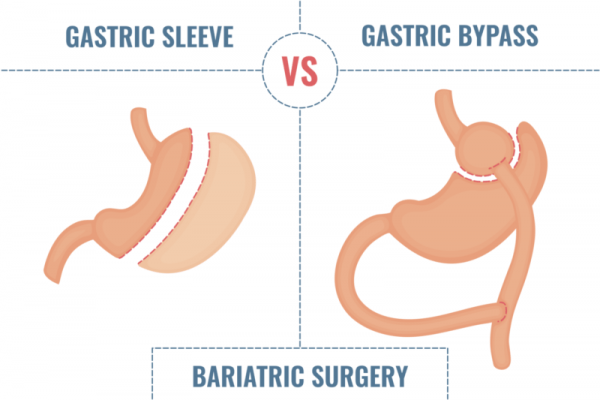Gastric Bypass vs. Gastric Sleeve
Considering bariatric surgery for weight loss? You have choices, including gastric bypass, laparoscopic band surgery, and gastric sleeve. But how do these procedures differ, and which is right for you? The More Clinic bariatric surgeons will guide you through the pros and cons of gastric baypass vs sleeve gastrectomy. We’ll help you make an informed decision based on your unique medical needs and goals.

Comparing the Gastric Bypass vs. Gastric Sleeve
To choose the best bariatric surgery for you, it’s important to understand the differences and similarities between gastric bypass and gastric sleeve procedures. Factors such as weight loss goals, health conditions, and surgical risks should be taken into account.

Gastric Bypass vs. Gastric Sleeve
1. Weight Loss: Both gastric bypass and gastric sleeve surgeries result in significant weight loss, with patients losing 50% to 70% of their excess body weight within the first two years after the procedure. However, gastric bypass is typically more effective in achieving greater weight loss in the long term, with some patients losing up to 80% of their excess weight within five years after the surgery.

2. Diabetes Remission: Both gastric bypass and gastric sleeve surgeries can improve or even resolve type 2 diabetes in obese patients. However, gastric bypass is more likely to result in diabetes remission than gastric sleeve, with up to 80% of diabetic patients experiencing remission after gastric bypass.
3. High Blood Pressure Improvement: Both gastric bypass and gastric sleeve surgeries can significantly reduce or eliminate high blood pressure in obese patients. However, gastric bypass is generally more effective in improving blood pressure than gastric sleeve.
4. High Cholesterol Reduction: Both gastric bypass and gastric sleeve surgeries can lower cholesterol levels in obese patients. However, gastric bypass is more effective in reducing LDL (bad) cholesterol and increasing HDL (good) cholesterol than gastric sleeve.
5. Sleep Apnea Improvement: Both gastric bypass and gastric sleeve surgeries can improve or even resolve sleep apnea in obese patients. However, gastric bypass is generally more effective in reducing the severity and frequency of sleep apnea than gastric sleeve.
6. Nutritional Considerations: Both gastric bypass and gastric sleeve surgeries can affect nutrient absorption and require lifelong vitamin and mineral supplementation. However, gastric bypass poses a greater risk of malabsorption and nutrient deficiencies than gastric sleeve, making careful monitoring and supplementation essential.
7. Surgical Approach: Gastric bypass surgery involves rerouting the digestive system to create a small pouch from the stomach, whereas gastric sleeve surgery involves removing a large portion of the stomach to create a smaller sleeve-shaped pouch. Gastric bypass is more complex and invasive than gastric sleeve, and may require a longer hospital stay and recovery period.

8. Reversibility: Both gastric bypass and gastric sleeve surgeries are considered irreversible, as they involve permanent alteration of the digestive system. However, in some cases, gastric sleeve may be converted to gastric bypass if necessary.
9. Long-Term Outcomes: Both gastric bypass and gastric sleeve surgeries can result in long-term weight loss and improved health outcomes. However, maintaining a healthy lifestyle with regular exercise and balanced nutrition is crucial for sustained success and preventing weight regain.
Overall, both gastric bypass and gastric sleeve surgeries can be effective options for obese patients seeking weight loss and improved health outcomes. However, the decision to undergo either procedure should be made in consultation with a qualified healthcare provider, based on individual needs, risks, and benefits.
Comparison of the Costs: Gastric Bypass vs Sleeve Gastrectomy
The cost of these surgeries can vary based on a few different factors, including geographic location, potential complications during surgery, and the type of surgery. It’s important to keep in mind that while cost is certainly a consideration, it’s not the only factor to consider when deciding on a bariatric surgery.
In general, gastric bypass tends to be more expensive than gastric sleeve. Related Post: Gastric Sleeve Cost Guide 2023. / Gastric By Pass Surgery Cost Guide
Gastric Sleeve Cost in Turkey
The cost of gastric sleeve surgery in Turkey can vary depending on a number of factors. On average, you can expect to pay around €3,500.00 or £3,000.00 for an all-inclusive package. However, you may find that the cost is as low as €3,000.00 or as high as €5,000.00 depending on which clinic you choose.
Gastric Bypass Cost in Turkey
The average cost of gastric bypass surgery at The More Clinics Turkey is $4,700 or £4,000, while the cost for the same surgery is $25,000 or £15,500 in the UK and USA. This significant difference in cost makes Turkey a more affordable option for patients seeking gastric bypass surgery.
Last Words from the More Clinics Turkey
While both gastric bypass and gastric sleeve surgeries can be effective for weight loss, they differ in terms of expected weight loss outcomes, long-term complications, and suitability for different patient groups. Ultimately, the choice between surgical procedures should be based on a thorough evaluation of the risks and benefits, as well as individual factors such as starting weight and medical history.
The More Clinics Turkey Bariatric Services, can help you to find all answers which is the best for you. Contact us today to learn more and let us book your free consultation.
GET A FREE CONSULTATION!
Let’s Start Planning Your Treatment %100 Guarantee Results.






